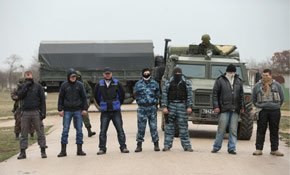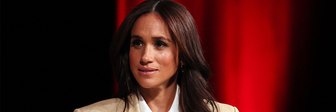John Humphrys asks: what should be the West's response to the crisis in Ukraine?
Vladimir Putin says that Russia is engaged in “a humanitarian mission” in Crimea. Few people believe him. Western governments certainly do not. They have expressed outrage at what they consider to be quite simply a Russian invasion of its neighbour, Ukraine, with the clear intent of taking over at least part of it. And they have threatened Russia with “costs and consequences” unless President Putin draws back. But the West is far from united about what those costs and consequences should entail. Are we right to interpret Russia’s actions as an aggressive military power grab? And, if so, how should we respond?
A great deal has happened in Ukraine in the last fortnight. The pro-Russian government of President Yanukovitch was overthrown by a popular rising during which his security forces killed ordinary Ukrainian citizens on the streets of Kiev. The Ukrainian parliament, in which he previously had a majority, turned against him and he fled to Russia. An interim government was installed, drawn heavily from the pro-EU western part of the country.
Russia denounced the new government as illegitimate, brought into being by a coup. President Putin moved swiftly to reassert Moscow’s influence in the country and especially in the Russian-speaking eastern half of it. In the semi-autonomous province of Crimea, where a majority of the population is ethnic Russian and which hosts Russia’s Black Sea fleet at Sevastopol, armed militia took control of strategic locations, including the airports, and surrounded the barracks of the Ukrainian armed forces in the region. Their uniforms bore no insignia but they were widely believed to be crack Russian soldiers. President Putin mobilised Russian forces on the border with Ukraine and seemed to threaten an invasion of the eastern part of the country.
Western governments were unanimous in charging Russia with blatant aggression against an independent country. They committed themselves to giving full support to the new Ukrainian government – though not military intervention - if President Putin did not restore the status quo ante.
All that happened over a few days last weekend. Since then, despite a great deal of talk, there has been, in effect, a stand-off. President Putin denies that Russia has any designs on Ukraine or that he is preparing a full-scale military invasion of the country although he reserves the right to take further military action “as a last resort”. But Russia remains in full control of Crimea. Its parliament voted on Thursday to leave Ukraine and rejoin Russia and has said a referendum will be held on the issue in less than a fortnight’s time.
Meanwhile, the West continues to protest loudly. President Obama, clearly seeing the hand of Moscow behind the referendum plan, immediately dismissed it as against international law and will refuse to acknowledge its result. European Union leaders called an emergency meeting and said the same. They also agreed with the United States, at least, in principle, to ratchet up the diplomatic and economic pressure on Russia. But whether they will be able to maintain that unity if they fail to get President Putin to climb down is far from clear. Mr Putin seems to think they won’t. And after what was described as a “vigorous” hour-long phone conversation between presidents Obama and Putin on Thursday night the two sides seem to be as far apart as ever.
So what are we to make of Russia’s actions and the western response? In the first place, should we simply condemn Russia’s behaviour outright, or does President Putin have more of a case?
He certainly thinks he does. First, he points out that President Yanukovitch came to power after an election that the international community accepted as reasonably free and fair. In his view, therefore, a democratically-elected government has been illegitimately overthrown, something the West ought to condemn given its own claims to uphold democracy.
Secondly, he argues that the coup that overthrew Yanukovitch was backed by fascist elements. There is some truth in that - even if the majority of Yanukovitch’s opponents were anything but fascist. But given Russia’s history, the fascist spectre has force: Russian and Ukrainian soldiers, jointly part of the Soviet Army, suffered horrendous losses fighting Nazi Germany during the Second World War. Russians are very sensitive to any prospect that fascism might return.
Thirdly, the very fact that Ukraine was formerly part of the Soviet Union and therefore historically under Moscow’s influence means that any suggestion of the country starting to look west rather than east causes alarm bells to ring in the Russian capital. That Ukraine might one day join the EU or, even worse, NATO, is anathema in Moscow and seen as a real threat to Russia’s legitimate interests. NATO was, after all, set up specifically to check Russian influence. And as for Crimea, that vital peninsula on the Black Sea was Russian long before the Soviet Union came along. The Soviet leader, Nikita Khruschev, may have ‘given’ it to Ukraine in the 1950s, but in the eyes of most Russians and many older ethnic Russians within Crimea, it is ‘really’ Russian: Catherine the Great made it so.
In short, then, President Putin argues that Russia is simply looking after its own, hence his claim that he’s been engaged in “a humanitarian mission”. But to many in the West this is all sophistry and special pleading. Worse, it is reminiscent to some of precisely the argument Hitler used when he marched into Czechoslovakia in 1938 to occupy the Sudetenland where he claimed ethnic Germans were in danger of being persecuted. The parallel has been explicitly made; and the conclusion is that the West must not again appease a land-grabbing military oppressor.
But if the West is not to intervene militarily itself, what can it do? European and American leaders have struggled to present a united front. They have agreed to impose targeted sanctions on Russia that would escalate in strength if President Putin refused to back down. But the rub will come if he doesn’t and the initial sanctions, involving breaking off preliminary discussions about the forthcoming Russian-hosted G8 meeting, boycotting ceremonies connected with the Paralympics in Sochi and imposing travel restrictions on Russians officials, seem unlikely to make him blink. Russia’s ambassador to Brussels, Vladimir Chizhov, remarked drily: “they do not appear to be overly impressive”.
What there is no agreement on is how the targeted sanctions should then be ratcheted up. The Americans, and some European governments, talk of targeting the financial assets of the oligarchs surrounding President Putin and of imposing trade sanctions against Russia. But some European governments fear such measures could hurt them more than the Russians. A confidential British briefing paper caught on camera expressed alarm at the possible effect on the City of London of financial sanctions; the French are concerned about arms deals among other things; and the Germans are worried about their huge export market in Russia and on the fact that Germany depends on Russia for almost 40% of its energy.
David Cameron has argued that these costs should, if necessary, be taken on the chin since the alternative of letting Russia get away with its actions is unthinkable. But others seem to believe, even while signing up to it that the policy of retaliatory escalation by the West would, beyond a certain point, be self-defeating. The Germans, in particular, are thought to believe that what the West should be doing is trying to get Russia into serious negotiations and finding a way to do a deal. Tough sanctions might jeopardise such a strategy.
In short, the argument comes down to one between advocates of realpolitik who recognise that Russia is a big player whose interests need respecting and those who believe that the use of force cannot be allowed to succeed.
No doubt President Putin would laugh at this characterisation of the choice. He might say: “So the West are outraged when big countries use their military power to protect their interests in smaller countries, are they? Is that what they felt when they invaded Iraq and helped topple the government of Libya?” He’ll also no doubt want to raise the example of Kosovo where, many think, the two sides were on exactly opposite sides of the argument.
For the moment at least, the tide of events seems to be going his way. So how should we respond? What’s your view?










